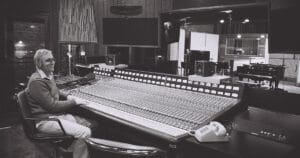After growing up in a southern California orphanage, Wallin was a U.S. Navy radio operator during World War II. After the war he worked in Los Angeles broadcast radio, engineering remotes to bring big band music to the air for CBS Radio, such as the Freddy Martin band at the Cocoanut Grove Ballroom, and Lawrence Welk from the Aragon Ballroom before he was ever on TV. But when TV did come in the 1950s, Wallin jumped to KTLA in Los Angeles. “I got really good at mixing music, because when you’re live, you can’t make any mistakes, Wallin said. “If you do, BOOM! — everybody in the world knows it.” That work ethic led Warner Bros. to hire him as their in-house music engineer in 1965, not only paying him double the “scale” salary, but guaranteeing him work five days a week, recording music by composers like Lalo Schifrin, John Barry, Bill Conti, Jerry Goldsmith, Elmer Bernstein, Henry Mancini, and John Williams for Warner projects. He loved being on staff since “you could bring your pants over to Wardrobe and have them tailored,” he laughed.

As a sound engineer for films, Wallin was hugely respected and prolific: IMDB shows he is credited on more than 600 films and TV shows, starting with Spartacus (1960) and ending with A Not So Hollow Halloween (2021) — that last one produced during retirement, when he was 94 years old; in 2012, when he was a mere 84, he was identified as the oldest working sound engineer in the film industry. In between he worked on some of the most beloved films from those 60 years: Camelot, The Great Race, Bonnie and Clyde, Cool Hand Luke, The Heart is a Lonely Hunter, Bullitt, The Wild Bunch, Dirty Harry, Somewhere in Time, Enter the Dragon, Willy Wonka & the Chocolate Factory, Tron, Lost Horizon, Blazing Saddles, Young Frankenstein, Taxi Driver, All the President’s Men, The Shootist, Roots, Oh God!, Saturday Night Fever, Invasion of the Body Snatchers, The China Syndrome, Airplane!, Ordinary People, Body Heat, Star Trek II: The Wrath of Khan, The World According to Garp, 48 Hrs., The Karate Kid, Out of Africa, Indiana Jones and the Last Crusade, Mrs. Doubtfire, Ratatouille, Up, and, obviously, hundreds more, including plenty of duds.
Wallin was nominated for two Oscars for Best Sound (Woodstock in 1970, and A Star is Born in 1976), and three Emmy Awards, winning one. He engineered music recordings in a different way, he said. “Most people use microphones for the first chairs [of each section]. I go the opposite way: I mic the sections, and then I fill in with the room [sound]. I think a scoring mixer should be able to produce all the sounds, not just an orchestra scoring sound.” Also, said composer Michael Giacchino, who scored Mission: Impossible — Ghost Protocol, “Danny came up when being an engineer really meant you were an engineer. He could build anything and also understood why and how it all worked. He was a genius and an endless fountain of knowledge from a period of Hollywood that is long gone. There is a tendency to put a lot of reverberation on film scores, and it tends to feel like it’s in a cathedral. It’s massive, and you lose the identity of the different instruments that are going on in there. On a Dan Wallin score, you can hear every instrument that’s playing.” Daniel Guy Wallin retired to Kauai, Hawaii, in 2013, and died there on April 10. He was 97.
